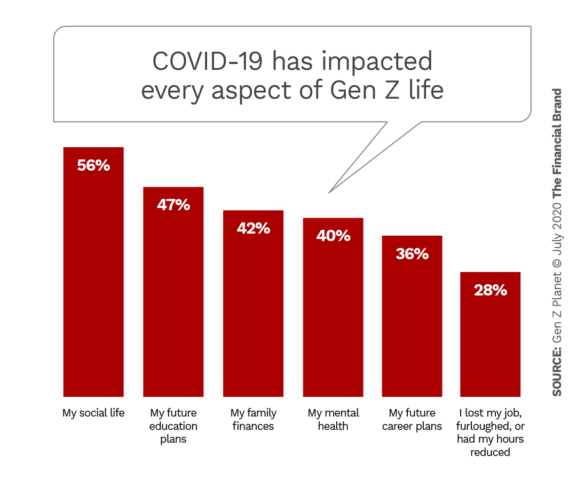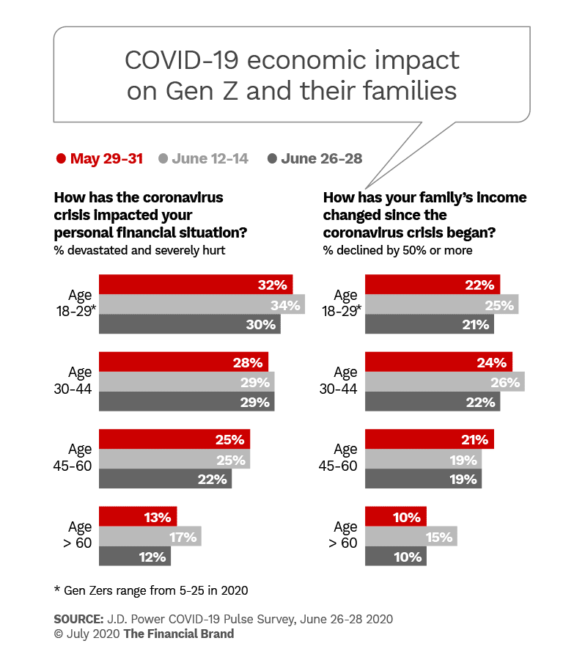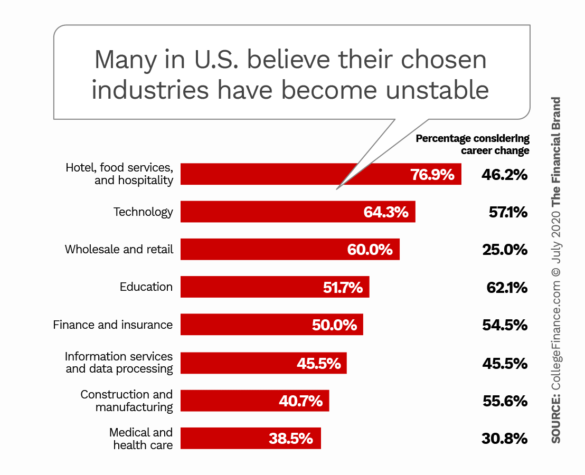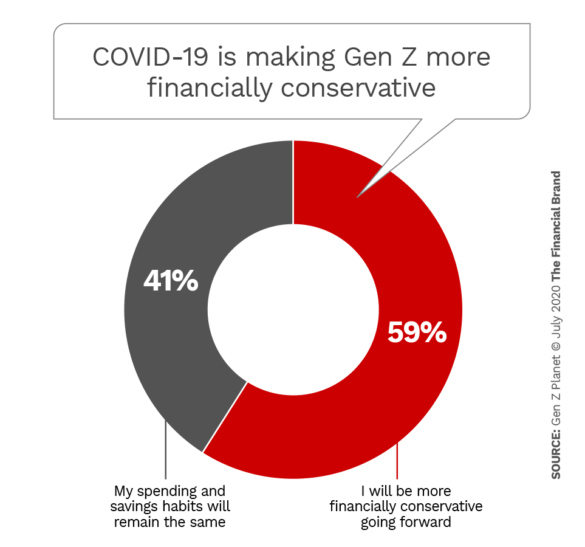Generation Z is experiencing the economic equivalent of being out for a run, turning a corner and running smack into a brick wall .
The upper half of this large generation — those currently age 15 to 25 — was entering into a strong economy with record-low unemployment. “That has all changed now, as COVID-19 has reshaped the country’s social, political and economic landscape,” says Pew Research Center in a blog. “Instead of looking ahead to a world of opportunities, Gen Z now peers into an uncertain future.”
The Center for Generational Kinetics, in a report, looks at the impact on each part of Gen Z:
- The youngest have had months without live schooling, seeing friends and working part-time jobs. Now they face summers of much of the same.
- Gen Zers completing high school saw standard tests go by the board and watched rites of passage like graduation and proms get cancelled or morphed into remote occasions. Summer jobs are sparse, fall plans still a big question mark.
- Uncertainty looms for Gen Zers in college and taking their early place in the workforce. The latter have often been the first let go or furloughed.
“Gen Zers already in the workforce are feeling a massive reset at exactly the time they should be starting to build their independence and self-reliance,” the consultancy observes.
What makes this sudden change of extra interest is that Gen Z had, and has been, shaping up as a generation that takes early responsibility for its financial affairs seriously. Yet despite all the turmoil, they still seem to have clear financial goals that are usually associated with later life stages, the center notes. Its annual report on “The State of Gen Z” indicates that:
- 91% hope to buy their own house someday.
- 69% think retirement savings should be a personal priority.
- 66% worry about not being able to pay off school loans — or how to avoid the debt in the first place.
- 55% of older Gen Zers (18-23) say their parents have the greatest influence on how they deal with money.
- 36% don’t feel prepared to make financial decisions.
Older Gen Zers work a good deal, when they can: 43% work full time and 44% work part-time. And three out of five have some kind of side job, often driven by an internet opportunity.

Fractional Marketing for Financial Brands
Services that scale with you.

The Power of Localized Marketing in Financial Services
Learn how to enhance your brand’s local visibility, generate more leads, and attract more customers, all while adhering to industry regulations and compliance.
Read More about The Power of Localized Marketing in Financial Services
Generation Z Faces Daunting and Uncertain Obstacles
What’s hitting this generation is a dual level of effects, based on multiple studies.
Real-life impact: One level consists of a very definite economic impact played out against a backdrop of a genuine health crisis exacerbated by often conflicting official and medical messaging and social turmoil unseen in several generations. Overlay this with unusually rabid election year politics and it’s easy to see how young people can become anxious.
Says the Center: “We believe the COVID-19 pandemic is the most formative Generation Defining Moment that has shaped Gen Z at this critical time in their transition into adulthood.”
Yet others say the coronavirus crisis can’t be looked at by itself. The Gen Z Planet consulting firm states in a report that “a series of seismic events that swiftly unfolded one after another during their formative years combined with the rapid evolution of consumer technologies has created a deep sense that ‘change is the only constant’.”
Gen Z Planet elaborates on this point: “The risks posed by climate change and the rise of social movements like #MeToo and #Blacklivesmatter, all have been absorbed by Gen Z in a visceral, instantaneous way that no other generation has previously experienced — delivered through their smartphones and social media channels.”
More immediately, according to the same study, during the pandemic these young people have seen upheaval on every front, as illustrated below.
But there’s also “virtual life.” The bar in the chart above concerning mental health underscores another level of change that Gen Z has seen. More than any previous generation, this one lives on social media.
If there was a line between fact and opinion on social channels before COVID-19, the line is now blurry at best. Under “normal” circumstances the Center for Generational Kinetics reports, one out of three Gen Zers spend most of their time outside of work or school on social media. They have spent even more time on those channels since the pandemic began, and anyone who has paid even rudimentary attention to the hashtags of each day can see the impact steeping in such “tea” for hours can have on one’s mental condition.
The industry in general and institutions specifically have to watch these channels carefully.
Beyond that, Gen Z Planet makes the point that “Gen Zers never had the privilege of ‘not knowing’.” The 24/7 news cycle constantly sits on their shoulders, as do peer and societal pressures driven by social media.
Now is the time to stress excellent, helpful content: The firm’s report makes a point that financial institutions interested in using quality web content to stand out can take to heart:
“In any communication with Gen Z, brands should demonstrate that they understand the scope and the seriousness of their current situation yet strive to add value by recognizing that Gen Zers are eager to be inspired, learn new things and have fun even when the world around them is in chaos.”
Read More: Why Millennials and Gen Z Love Megabanks
Generation Z Digs in Deeper in Response to COVID Stress
While unemployment trends have improved in the latest reports, that is only in comparison to earlier COVID-era tallies. The nation’s economy remains in a very deep hole.
As the chart above from J.D Power data indicates, for many in Gen Z the pandemic’s impact on finances has been a double hit. First, they have been impacted personally, but second, there is an impact on their families as well that is generally separate. Other age groups would see an impact that’s more blended as the status of the breadwinner often is the status of the household.
Pew Research Center finds that half of the oldest in Gen Z indicate that they or another in their household have lost a job or taken a pay cut due to the lockdowns. Pew Research indicates that this figure was higher than reported by other generations: Millennials (40%), Gen Xers (36%) and Baby Boomers (25%).
Many Americans overall are considering whether they should remain in their fields of training or current employment, according to research by CollegeFinance.com. As the chart below shows, there is a strong leaning in some fields to look into a major career shift.
Nearly half — 46% — of all Americans polled by CollegeFinance.com feel their job or planned career path has become less stable. One out of five say they would consider going back to school to change careers. Amazingly, many of those people already have student loan debt and would be willing to take on more to make the shift.
Regarding Gen Z specifically, from CollegeFinance.com’s research:
- 65% of Gen Zers are considering returning to college or staying there longer, due to the economic slump.
- 66% say their planned career path seems less stable now.
- One in three have had job interviews cancelled.
- 11% have had pay offers cut back.
- 23% of those who weren’t let go or furloughed in round one of the virus fear being laid off if there is a second wave.
The reaction of older Gen Zers to the COVID crunch is interesting. Overall, as seen below, they are becoming more conservative than they already were, according to Gen Z Planet data.
What they absorbed watching their parents during the Great Recession has apparently left a deep impression that financial security is critical. However, Gen Z Planet found that while COVID has increased frugality among the generation, they aren’t all about denying themselves. The firm’s research found that Gen Zers of all income levels have made some discretionary purchases during the COVID period.
All of these findings underscore the value that financial institutions can bring to consumers with fresh, relevant content about subjects like budgeting, saving money, retirement planning and other subjects that Gen Z craves guidance on. This would be a good time to be a BFF — “best financial friend.” Why not Zoom-based chat sessions with Gen Z audiences?
Read More: Banking Must Take A Stand On Tough Social Issues

Optimism and Interest in Shopping Small and Local
In spite of all that has happened and in spite of continual social media feeds, Generation Z actually has more optimists than pessimists, according to Gen Z Planet.
Almost 70% say that they feel optimistic for the future. On one hand they say this is due to confidence that scientists will find a cure for COVID-19. Another statement that resonated with the optimists: “Humanity has always been quite resilient.”
“Their lives got stirred but their attitudes, value and optimism are unshaken,” the report observed.
One wrinkle of special interest to community banks and credit unions, and any institution with a local bent, is the same study’s finding that the pandemic brought local businesses into the spotlight.
Four out of ten Gen Z respondents said that they would do more buying with small businesses as the country reopens. Said one Gen Zer: “I have never been as conscious as to who my money affects. It made me a lot more selfless and wanting to support local business.”
This attitude is something financial marketers and their institutions overall can work with, tying in their own marketing with local promotion and helping local business customers to get ready for the “new normal” — whenever it arrives.











